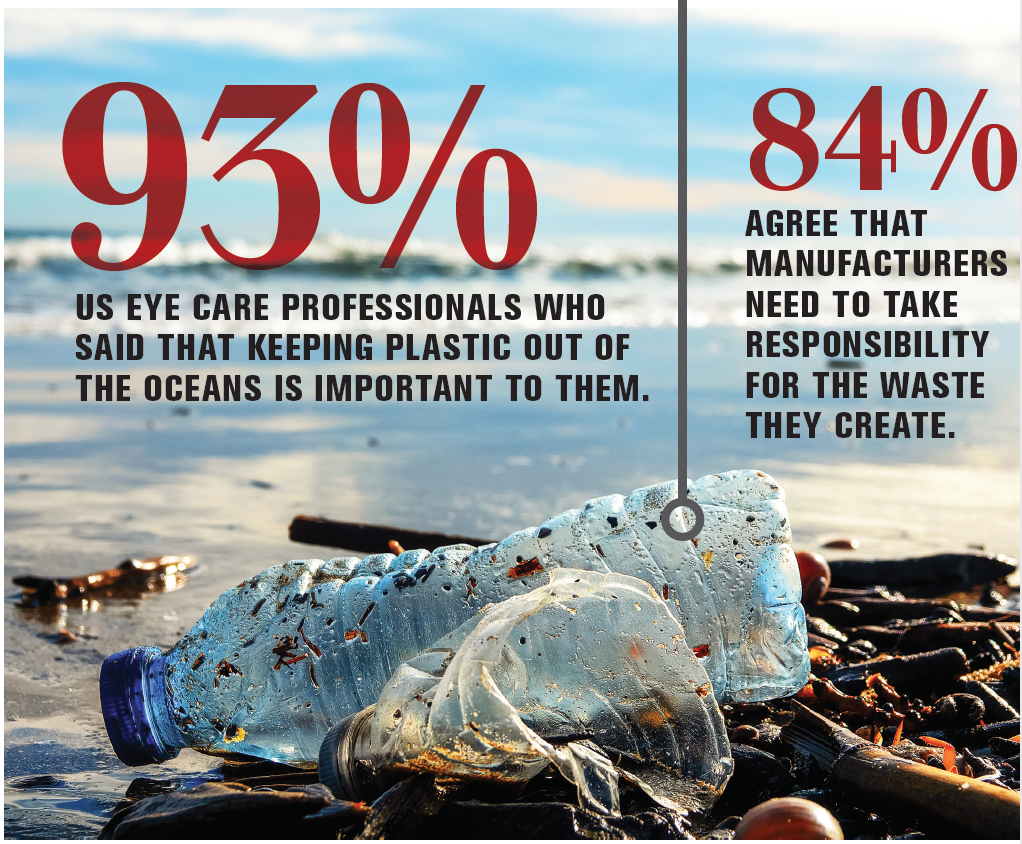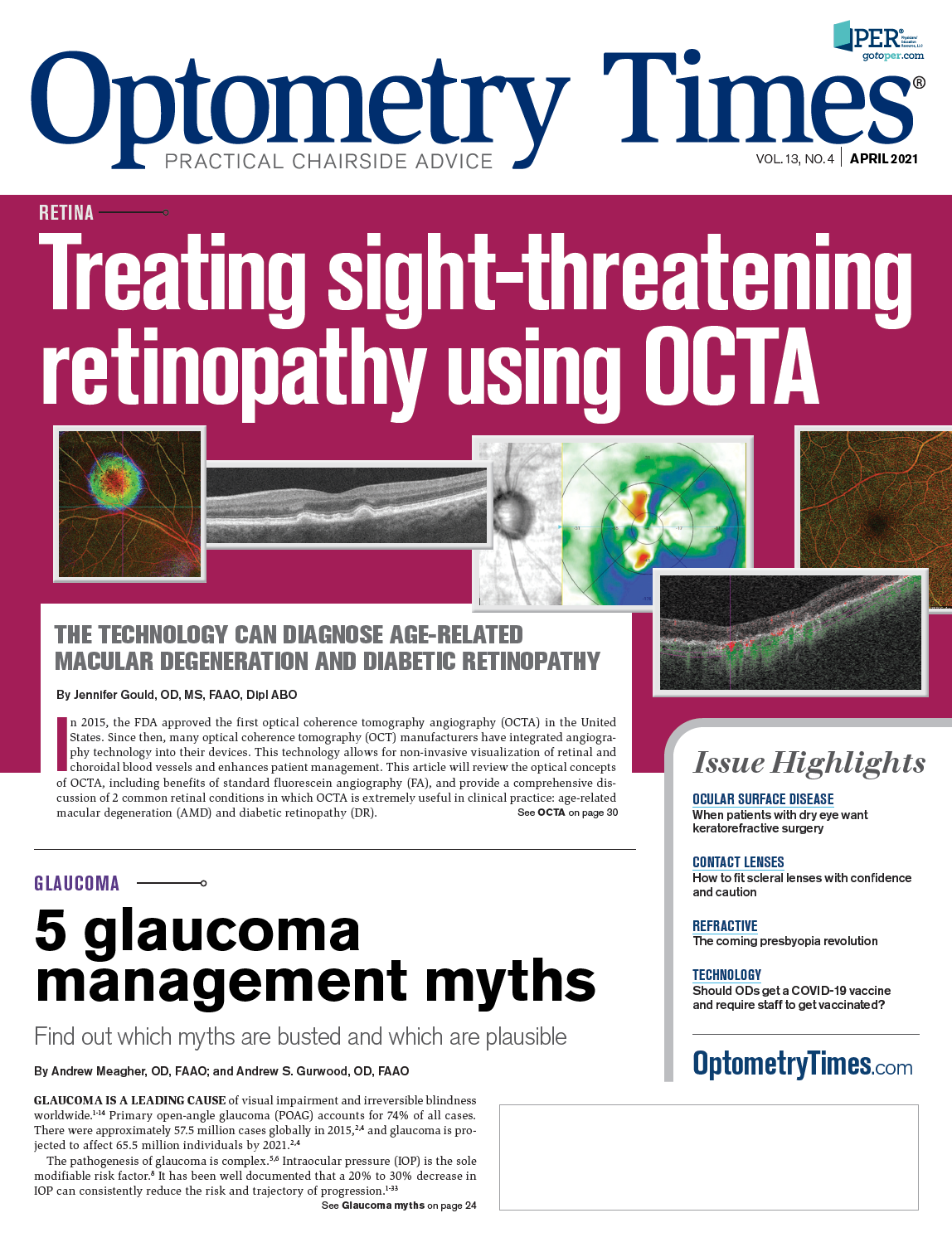News updates April 2021
Eye care news
New World Medical has launched the KDB Glide device for advanced excisional goniotomy treatment of glaucoma. KDB Glide was registered with the FDA in October 2020 and is now commercially available to ophthalmic surgeons across the United States.
The device’s proprietary ramp facilitates lifting and stretching the trabecular meshwork, while the dual blades penetrate the trabecular meshwork and create parallel incisions for precise, controlled excision, according to the company. New features of a rounded heel, tapered sides, and smaller footplate deliver optimal interface with the canal of Schlemm, permitting precise excision, even in variable anatomy.
The Centre for Ocular Research & Education (CORE) has published issue number 58 of its free online education magazine, Contact Lens Update. This edition launches a new case record feature that shares research-relevant yet patient-centered insights as experienced by practicing eye care professionals.
Along with other content, Andrea Lasby reviews a recent publication that investigates the potential for meibomian gland changes to distinguish dry eye from normal eyes in young adult wearers.
Plus, Andrew Pucker’s editorial addresses commonly asked questions about meibomian gland dysfunction, weighing the evidence and clinical implications for each.
Published 6 times per year, Contact Lens Update provides a global platform for unbiased clinical insights based in current research. The publication receives support from the educational arms of Alcon, CooperVision, and Johnson & Johnson Vision.
Kala Pharmaceuticals announced that pharmacy benefit manager Express Scripts has added Eysuvis (loteprednol etabonate) 0.25% to its National Preferred, Basic, and High Performance Formularies, effective February 5, 2021.
Eysuvis was approved in October 2020 for the short-term treatment of the signs and symptoms of dry eye disease and became commercially available in the United States in January 2021.
CooperVision has expanded the range of Biofinity XR toric contact lenses stocked at its global distribution center in New York. The following parameter ranges are now available to ship next day to customers:
– Sphere: Plano to -6.00 D in 0.50 D steps
– Axis: 10˚ to 180˚ in 10˚ steps
– Cylinder: -2.75 D and -3.25 D
Although Biofinity XR toric remains a made-to-order product for many prescriptions, the expanded inventories will speed access.
CooperVision is also stocking trial lenses in the same parameters. Orders placed directly through CooperVision and select authorized distributors will ship the following business day.
Biofinity XR toric lenses are available in sphere powers from +10.00 D to -10.00 D (0.50 D steps after ±6.00 D), with cylinder powers from -2.75 D to -5.75 D (0.50 D steps) and axes of 5˚ to 180˚ in 5˚ steps.
Genentech shared new data from 4 phase 3 studies of its investigational bispecific antibody faricimab showing it allowed a significant number of patients to go up to 4 months between treatments for 2 common causes of vision loss, diabetic macular edema and neovascular age-related macular degeneration.
According to the company, key findings from all 4 studies include:
– Approximately half of people receiving faricimab could be treated every 4 months in the first year while achieving similar vision gains compared with aflibercept given every 2 months.
– Approximately 75% of people receiving faricimab in the studies could be treated every 3 months or longer in the first year.
– Faricimab demonstrated rapid and consistent improvements in anatomical outcomes including central subfield thickness across all studies.
– Faricimab was generally well tolerated, with no new or unexpected safety signals identified.
Visionary Optics launched its VibrantVue product line in collaboration with ABB Optical Group.
VibrantVue Contact Lens Hand Prep is the only product marketed as a “no rinse” hand cleanser specifically for all soft and gas permeable contact lens wearers. It is available in 8-oz and 2-oz sizes.
VibrantVue Scleral Saline solution is the most recently FDA-approved scleral filling solution. It comes in 100-count, single-use 5-mm vials. The company is offering samples for eye care practitioners to provide to their new scleral lens patients.
VibrantVue Lid and Lash Care products include a hydrogel formulation for in-office treatment and liquid spray for at-home maintenance by patients. The 3-oz bottles, on average, will last a patient 3 months.
Glaukos Corporation shares that US phase 3 pivotal trial results for its next-generation corneal cross-linking iLink therapy for the treatment of keratoconus, called Epi-on, met the study’s primary efficacy end point. Epi-on demonstrated a statistically significant improvement in maximum corneal curvature (Kmax) at 6 months from baseline between the treated and placebo-controlled arms.
Epi-on is designed to reduce procedure times, improve patient comfort, and shorten recovery time, according to the company. It utilizes a proprietary, novel drug formulation to penetrate the epithelial layer of the cornea, a stronger UV-A irradiation protocol, and the ability to deliver increased levels of supplemental oxygen to enhance cross-linking. If approved, the company anticipates Epi-on would be the first FDA-approved, noninvasive corneal cross-linking therapy that does not require removal of the epithelium.
The phase 3 trial results are expected to support Glaukos’ NDA submission in 2022, and the company is targeting FDA approval for Epi-on in 2023.
Visus Therapeutics announced that the FDA has accepted its investigational new drug (IND) application to proceed with the clinical development program for Brimochol. A proprietary combination of carbachol and brimonidine tartrate, Brimochol is designed to be a once-daily eye drop to correct for the loss of near vision associated with presbyopia. Under this IND, Visus will immediately initiate its planned phase 2 clinical trial in the United States.
Six clinical studies have been conducted in more than 200 patients to evaluate the safety and efficacy of Brimochol, according to the company. These studies demonstrated an average near visual acuity improvement of 5 lines or more on the Jaeger eye chart, with a minimum duration of 8 hours post dose.
Johnson & Johnson Vision introduced Acuvue Oasys Multifocal Contact Lenses With Pupil Optimized Design for patients with presbyopia. The new lens is available in the United States and Canada. Acuvue Oasys Multifocal is built on the Acuvue Oasys 2-Week platform. It includes the Pupil Optimized Design technology used in 1-Day Acuvue Moist Multifocal.
Acuvue Oasys Multifocal combines 3 technologies—Pupil Optimized Design, Hybrid Back Curve Technology, and a proprietary embedded wetting agent—to create a lens designed for performance and comfort, according to the company.
The State University of New York (SUNY) College of Optometry has received a $30,000 gift from CooperVision. In recognition, SUNY Optometry named a specialized myopia examination room located in the college’s University Eye Center in the company’s honor.
In 2020, CooperVision introduced MiSight 1 day, the only FDA-approved daily soft contact lens designed to slow the progression of myopia in children aged 8 to 12 years. The company’s interest in myopia is a shared area of expertise with SUNY Optometry that offers a myopia management clinic for pediatric patients and adults.
CooperVision shared its 2021 Best Practices honorees. Now in its sixth year, CooperVision’s Best Practices program highlights optometric practices in the US that advance the profession through innovation, industry leadership, and exceptional patient experience. The new honorees join a group of 50 other optometry practices that have supported the initiative.
The 2021 Best Practices honorees are:
– Alamo Eye Care in San Antonio, Texas
– Bellaire Family Eye Care in Bellaire, Texas
– Blink in Albuquerque, New Mexico
– Bright Eyes in Tampa, Florida
– Broad View Eye Center in Broadview Heights, Ohio
– Carbon Valley Eye Care in Frederick, Colorado
– Clearvue Vision Center in Kent, Washington
The other reassures patients of common steps being taken to ensure safety during in-office exams. Both are available for download from COVIDeyefacts.org and may be used at no cost if the content is not altered.
Essilor celebrates 25 years of lab growth. On March 15, 1996, Essilor acquired 3 lab groups—Omega, Southern Optical, and Duffen—to accelerate growth for independent eye care professionals, laboratories, and the industry as a whole.
The acquisition prompted Essilor to create a network of labs across the country that offers value for customers, according to the company. Today, Essilor creates access to innovation and elevates patient care for its customers through several optical labs: Essilor Labs, which delivers consistent quality on time; Partner Labs, which benefits from the partnership of Essilor while maintaining their own qualities and strengths; and Independent Labs, which distributes and produces Essilor’s lens innovations.

CooperVision says it has entered a partnership with Plastic Bank, which makes its clariti 1 day family the first net plastic-neutral contact lenses.
Plastic Bank builds ethical recycling ecosystems in coastal communities, reprocessing the materials for reintroduction into the global supply chain. Collectors receive a premium for the materials they collect, helping them provide basic family necessities such as groceries, cooking fuel, school tuition, and health insurance. For every box of clariti 1 day distributed in the US, CooperVision funds the collection, processing, and reuse of general plastic waste that is equal to the weight of the plastic in clariti 1 day lenses and packaging.
A recent survey commissioned by CooperVision revealed that 93% of US eye care professionals said that keeping plastic out of the oceans is important to them, and 84% agree that manufacturers need to take responsibility for the waste they create.

Newsletter
Want more insights like this? Subscribe to Optometry Times and get clinical pearls and practice tips delivered straight to your inbox.